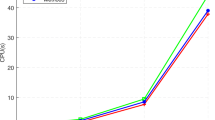Abstract
In this paper, a second-order backward differentiation formula (BDF) scheme for a hybrid MHD system is considered. Being different with the steady and nonstationary MHD equations, the hybrid MHD system is coupled by the time-dependent Navier-Stokes equations and the steady Maxwell equations. By using the standard extrapolation technique for the nonlinear terms, the proposed BDF scheme is a semi-implicit scheme. Furthermore, this scheme is a decoupled scheme such that the magnetic field and the velocity can be solved independently at the same time as discrete level. A rigorous error analysis is done and we prove the unconditionally optimal second-order convergence rate \(\mathcal O(h^{2}+({\Delta } t)^{2})\) in L2 norm for approximations of the magnetic field and the velocity, where h and Δt are the grid mesh and the time step, respectively. Finally, the numerical results are displayed to illustrate the theoretical results.
Similar content being viewed by others
References
An, R., Li, Y.: Error analysis of first-order projection method for time-dependent magnetohydrodynamics equations. Appl. Numer. Math. 112, 167–181 (2017)
An, R., Zhou, C.: Error analysis of a fractional-step method for magnetohydrodynamics equations. J. Comput. Appl. Math. 313, 168–184 (2017)
Brenner, S., Scott, L.: The mathematical theory of finite element methods. Springer, New York (1994)
Gao, H., Qiu, W.F.: A linearized energy preserving finite element method for the dynamical incompressible magnetohydrodynamics equations. Comput. Methods Appl. Mech. Eng. 346, 982–1001 (2019)
Gerbeau, J.: A stabilized finite elemenet method for the incompressible magnetohydrodynamic equations. Numer. Math. 87, 83–111 (2000)
Gerbeau, J., Bris, C.L.: Mathematical study of a coupled system arising in magnetohydrodynamics, Technical Report CERMICS
Gerbeau, J, Bris, C.L.: A coupled system arising in magnetohydrodynamics. Appl. Math. Lett. 12, 53–57 (1999)
Gerbeau, J., Bris, C.L., Lelièvre, T.: Mathematical methods for the magnetohydrodynamics of liquid metals. Oxford University Press, Oxford (2006)
Gunzburger, M., Meir, A., Peterson, J.: On the existence, uniqueness, and finite element approximation of solutions of the equations of stationary, incompresible magnetohydrodynamics. Math. Comp. 56, 523–563 (1991)
He, Y.: Unconditional convergence of the Euler semi-implicit scheme for the three-dimensional incompressible MHD equations. IMA J. Numer. Anal. 35, 767–801 (2015)
Heywood, J., Rannacher, R.: Finite-element approximation of the nonstationary Navier-Stokes problem Part IV: error analysis for second-order time discretization. SIAM J. Numer. Anal. 27, 353–384 (1990)
Li, Y., Ma, Y., An, R.: Decoupled, semi-implicit scheme for a coupled system arising in magnetohydrodynamics problem. Appl. Numer. Math. 127, 142–163 (2018)
Li, Y., Luo, X.: Second-order semi-implicit Crank-Nicolson scheme for a coupled magnetohydrodynamics system. Appl. Numer. Math. 145, 48–68 (2019)
Li, B., Sun, W.: Error analysis of linearized semi-implicit Galerkin finite element methods for nonlinear parabolic equations. Inter. J. Numer. Anal. Model. 10, 622–633 (2013)
Li, B., Sun, W.: Unconditional convergence and optimal error estimates of a Galerkin-mixed FEM for incompressible miscible flow in porous media. SIAM J. Numer. Anal. 51, 1959–1977 (2013)
Prohl, A.: Convergent finite element discretizations of the nonstationary incompressible magnetohydrodynamic system. ESAIM:M2AN 42, 1065–1087 (2008)
Schötzau, D.: Mixed finite element methods for stationary incompressible magneto-hydrodynamics. Numer. Math. 96, 771–800 (2004)
Temam, R.: Navier-stokes equations, North-Holland, Amsterdam (1977)
Yang, X.F., Zhang, G.D., He, X.M.: Convergence analysis of an unconditionally energy stable projection scheme for magnetohydrodynamic equations. Appl. Numer. Math. 136, 235–256 (2019)
Zhang, G.D., He, X.M., Yang, X.F.: A decoupled, linear and unconditionally energy stable scheme with finite element discretizations for magnetohydrodynamic equations. J. Sci. Comput. 81, 1678–1711 (2019)
Zhang, G.D., He, X.M., Yang, X.F.: Fully decoupled, linear and unconditionally energy stable time discretization for solving the magnetohydrodynamic equations. J. Comput. Appl. Math 369, #112636 (2020)
Zhang, Y., Hou, Y., Shan, L.: Numerical analysis of the Crank-Nicolson extrapolation time discrete scheme for magnetohydrodynamics flows. Numer. Methods Part. Diff. Equa. 31, 2169–2208 (2015)
Funding
This work was supported by National Natural Science Foundation of China (No.11771337) and by Zhejiang Provincial Natural Science Foundation (No. LY18A010021).
Author information
Authors and Affiliations
Corresponding author
Additional information
Communicated by: Jan Hesthaven
Publisher’s note
Springer Nature remains neutral with regard to jurisdictional claims in published maps and institutional affiliations.
Rights and permissions
About this article
Cite this article
Li, Y., Zhai, C. Unconditionally optimal convergence analysis of second-order BDF Galerkin finite element scheme for a hybrid MHD system. Adv Comput Math 46, 75 (2020). https://doi.org/10.1007/s10444-020-09815-w
Received:
Accepted:
Published:
DOI: https://doi.org/10.1007/s10444-020-09815-w



